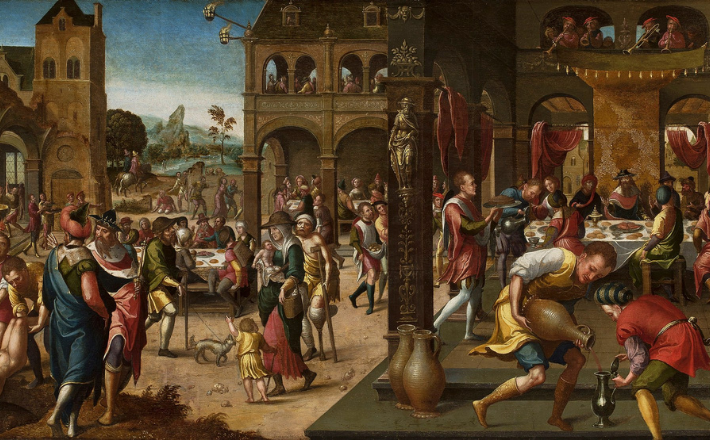Commentary on Proverbs 25:6-7
“O God, if you are going to lift me, please lift me without losing me.” This prayer uttered by a nationally and internationally known preacher and evangelist brought great encouragement to me, so much so that I have prayed the same prayer many times over since I met him. I whisper it silently and sometimes out loud whenever a door opens because of God’s grace and mercy. In that same conversation, he told me that his life became a lot more enjoyable and exciting when he started to let God lift him and stopped trying so hard to lift himself. He decided against pushing and shoving his way through doors that were closed or barely open to him, opting instead to walk through doors that only God could have opened for him.
Proverbs 25:6–7 invites us into a similar vision of ourselves in terms of how we relate to our world—in particular, leaders in our world. It rids us of any pretensions that leaders are somehow fortunate to be around us or that churches are fortunate to have us.
From time to time, it is good medicine for Christians, leaders in particular, to remember they are less important than they think they are. We need to hear it more often than we think we do. To paraphrase a popular and self-deprecating saying among Argentinians, “If an Argentinian wants to injure himself seriously, all he has to do is climb to the top of his ego and jump.”
According to Proverbs 25:6–7, the consequences for misguided self-promotion are especially serious when a person tries in vain to force himself or herself through doors that are closed or barely open in the first place. A wise person knows not to put himself or herself forward in the presence of a king or to “stand in the place of the great” (verse 6).
Although it is impossible to prove, many scholars believe these sayings in Proverbs 25 inspired Jesus’ parable of the wedding banquet in Luke 14:7–11; thus, the pairing of Proverbs 25 with Luke 14 in the lectionary. In that parable, Jesus says that a guest at a wedding banquet should not sit in the place of honor only to be downgraded and humiliated. Rather, a guest should sit in a place of low status so that the host might come and say, “Friend, move up higher.” When the latter happens, the person will receive honor among the guests.
Whether in Proverbs 25 or Luke 14, the same truism applies: It is better to be invited to move up than it is to be asked to move down. When the latter happens, not only does it lay bare one’s lack of humility and self-knowledge, but it also exposes one to great shame and humiliation in an honor/shame context.
Let God lift you. It will be a lot more energizing and invigorating if God does it. God always seems to do a much better job than any of us could do.
When confronted with a passage like this, many of us try to find ways to slip free from its net. We remind ourselves and others of our prophetic task to speak truth to power. Neither this text nor the book of Proverbs as a whole contradicts the prophetic work that God desires from us. The leaders who are rebuked here have become so accustomed to the trappings of power that they are more interested in climbing ladders than they are in speaking truth.
Even so, weary prophets have something to learn too. A popular proverb in India goes like this: “There is no use punching someone in the nose and giving him a rose smell.” Prophets would do well to hear and heed the words of Proverbs 12:18, “Rash words are like sword thrusts, but the tongue of the wise brings healing.”
In a modern setting, a good way to insult your host at her dinner table is to tell her that the food is bland and her home is ugly. Even if it is true, you have lost a hearing rather than gained it. More importantly, you have lost the relationship as well.
Another mistake we make is to assume that this lesson has to do with behavior around those with influence and that it somehow does not deal with our character at all times in all places. This mistake can be especially seductive since so many proverbs involve situational wisdom in specific scenarios, as opposed to universally applicable responses for all situations.
Although these verses deal with concrete situations, interactions with rulers, a group of people who show up in Proverbs 25 and elsewhere in the book, this way of seeing ourselves has universal application. One needs to look no further than Proverbs 27:2 to discover how important this is in every situation and not just when we are standing with kings or in the so-called places of the great: “Let another praise you and not your own mouth, a stranger and not your own lips.”
The writer of the book of James knew how important it was at all times and in all places, drawing from the book of Proverbs to make a similar insight: “Humble yourselves before the Lord and he will exalt you” (James 4:10; see also 4:6; Proverbs 3:34; 1 Peter 5:5–6).
Jesus understood its applicability as well. In the parable of the wedding banquet, great joy comes to the host at seeing his guest be free from self-promotion and pretension. The guest adopts a far healthier posture, understanding himself or herself in relation to the master of the banquet rather than the other guests.
When we adopt the same posture, we focus less on ourselves, our status in comparison to others, our relentless need to climb. We remember we are less important than we think we are. We place ourselves in relation to the One who is most important instead of to others. In doing so, we discover that it is far better for us to relate to God and others that way. Moreover, we let God lift us instead of working so hard to lift ourselves. We become last in the best sense of that word. The first will be last, and the last will be first. As Jesus puts it, “All who exalt themselves will be humbled, and those who humble themselves will be exalted” (Luke 14:11).


August 31, 2025